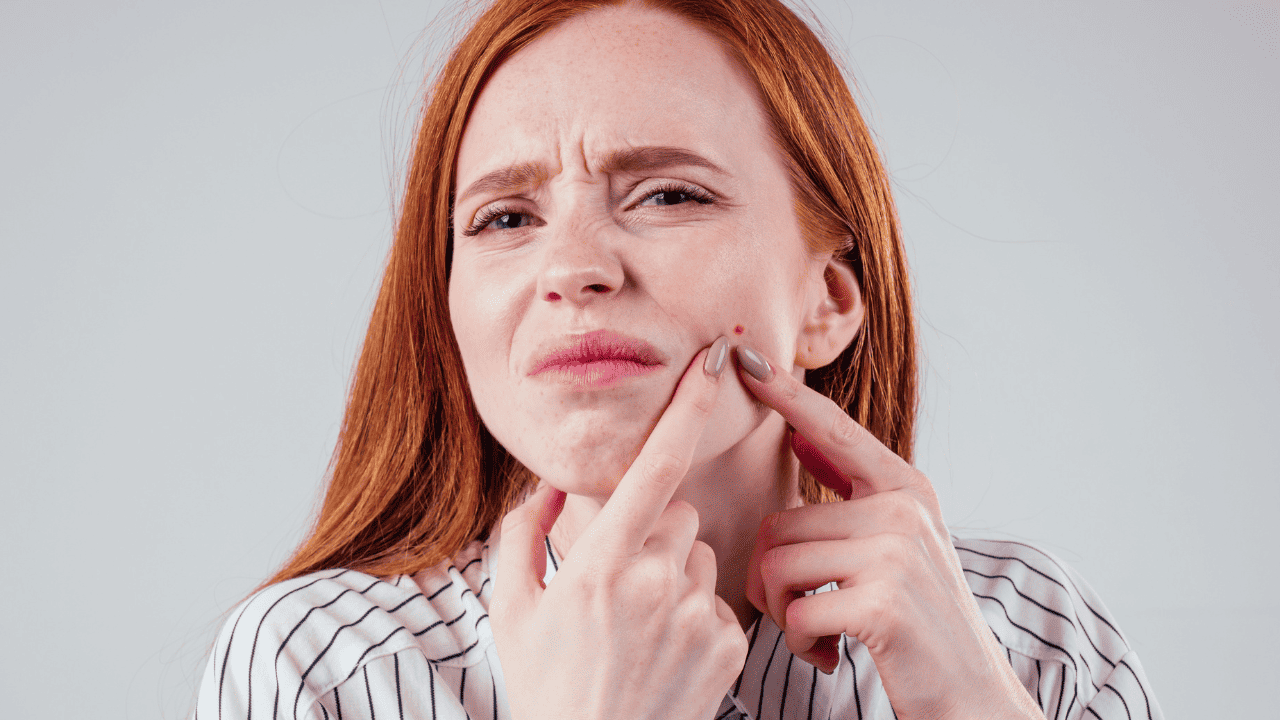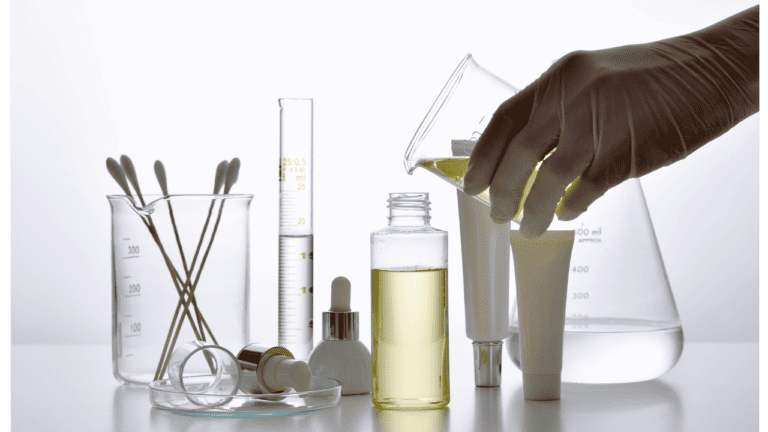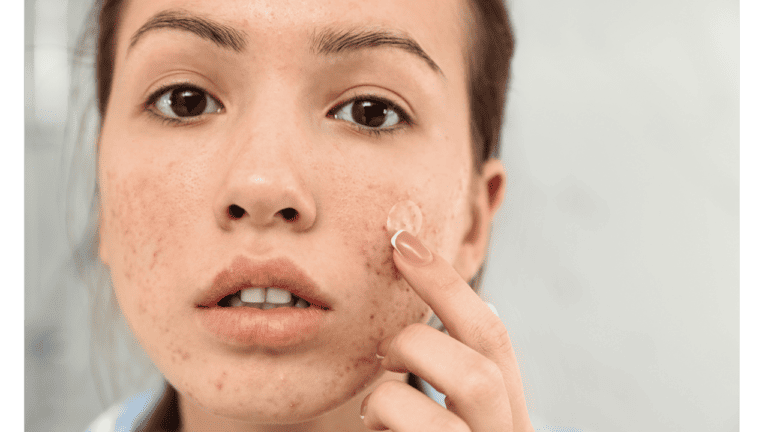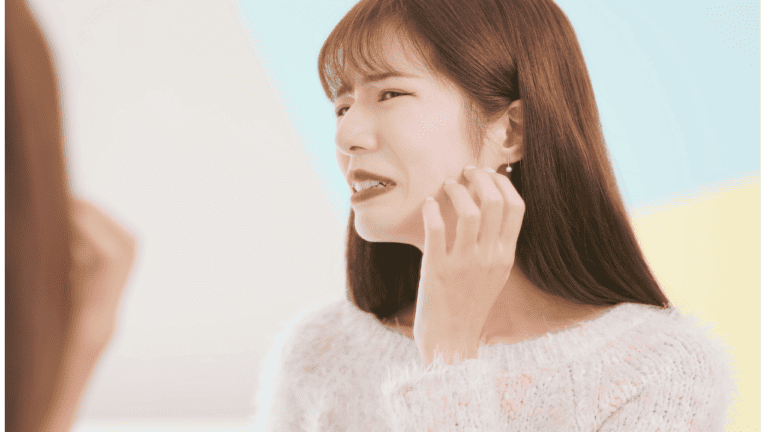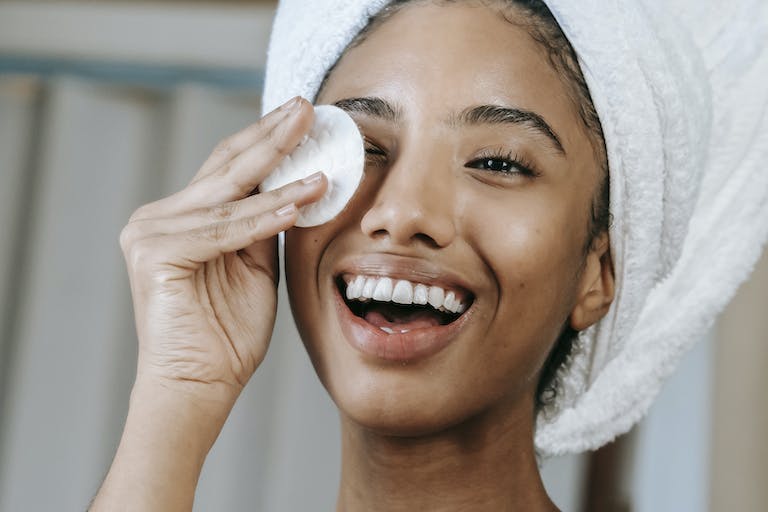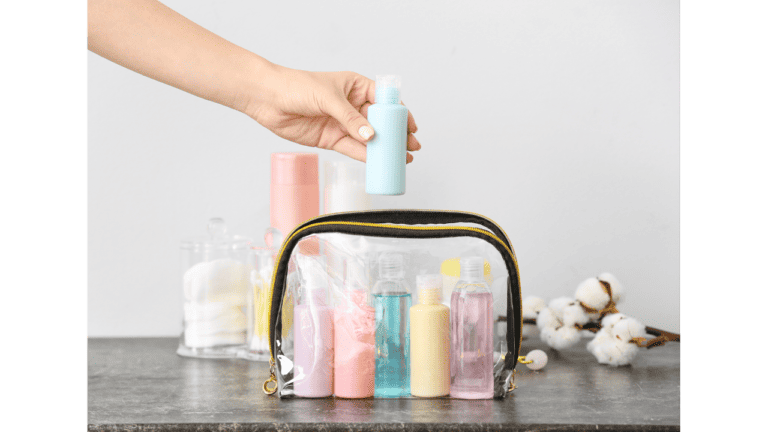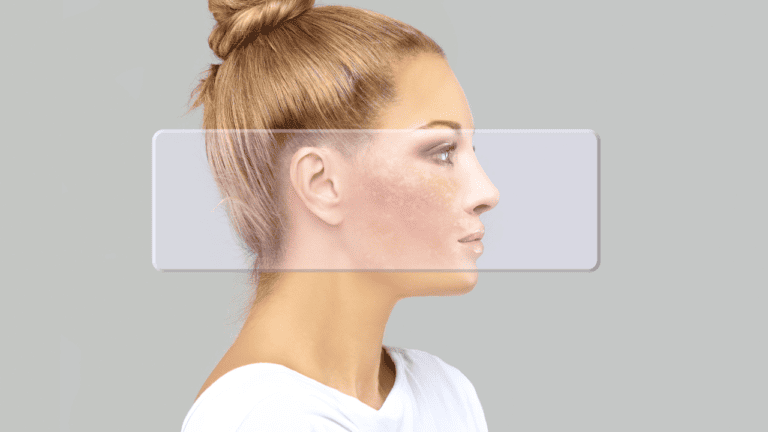Blind pimples are notorious for being difficult to treat, and many people are tempted to pop them to relieve the pain. However, popping a pimple that isn’t ready can actually make the problem worse, leading to scarring and further inflammation.
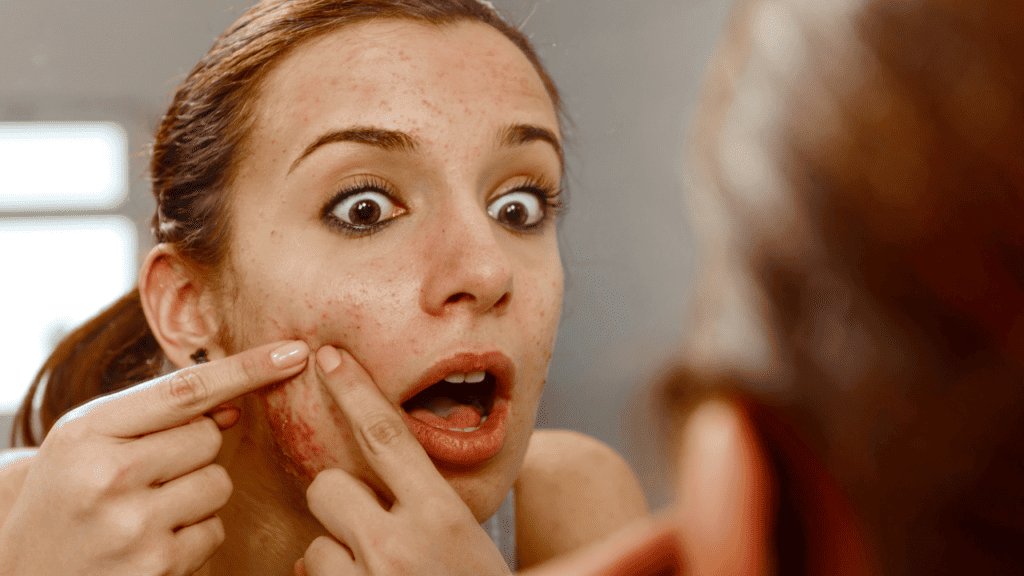
If you’re dealing with a painful pimple, it’s important to understand what’s causing it and how to treat it effectively. Blind pimples are caused by a buildup of oil and bacteria in the skin, which usually leads to inflammation and pain. Attempting to pop a blind pimple rarely works out well, first of all because there is no white head to the pimple (the pus has not accumulated at the top), you most likely won’t be able to pop it and you could push bacteria deeper into the skin causing further inflammation. So what do we do?
Instead of popping a pimple that hurts, there are several alternative treatments and preventative measures that we’ll go through today.
Key Takeaways
- Blind pimples are caused by a buildup of oil and bacteria in the skin, which can lead to inflammation and pain.
- Popping a pimple that isn’t ready can actually make the problem worse, leading to scarring and further inflammation.
- There are several alternative treatments and preventative measures that you can try to reduce inflammation and promote healing without causing further damage to your skin.
Understanding Acne and Pimples
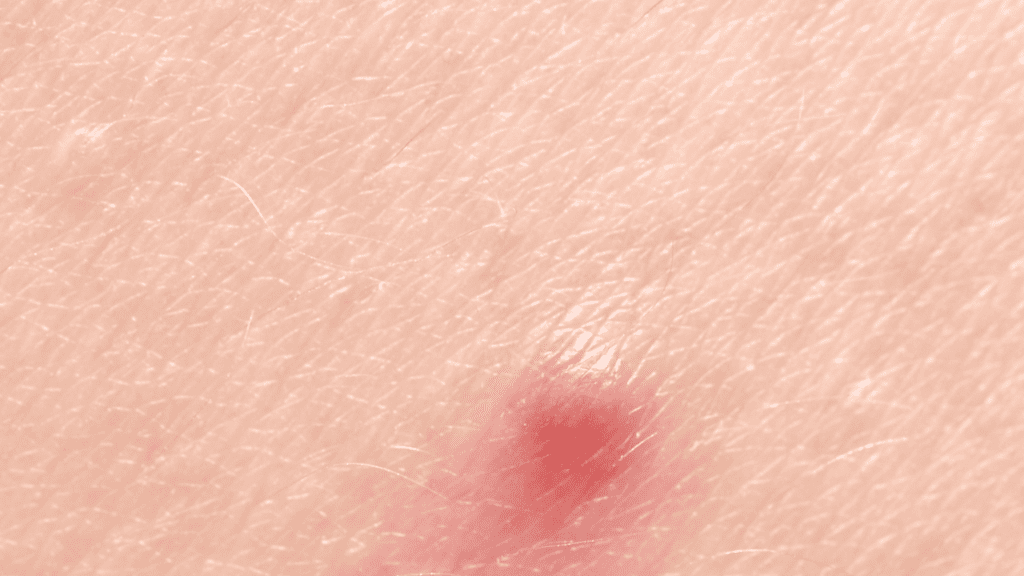
Acne is a common skin condition that affects millions of people worldwide. It occurs when hair follicles become clogged with oil, dead skin cells, and bacteria, resulting in the formation of pimples. Pimples are small, inflamed bumps on the skin that can be painful and unsightly.
Types of Acne
There are several types of acne, including whiteheads, blackheads, papules, pustules, nodules, and cysts. Whiteheads and blackheads are the most common types and are caused by clogged pores. Papules and pustules are inflamed pimples that can be painful and filled with pus. Nodules and cysts are the most severe types of acne and can cause scarring.
Causes of Pimple Formation
The main cause of pimple formation is the overproduction of oil by the sebaceous glands. These glands are located beneath the skin and produce an oily substance called sebum. When too much sebum is produced, it can mix with dead skin cells and bacteria, clogging the hair follicles and causing pimples to form. Hormonal changes, stress, and certain medications can also contribute to the development of acne.
It is important to note that popping a pimple that hurts, especially a blind pimple or inflamed one, is not recommended. Doing so can cause the pimple to become more inflamed, increase the risk of infection, and potentially leave a scar. Instead, it is best to wait until the pimple is ready to be popped, which is typically when a white or yellow head has formed on the surface.
Why You Shouldn’t Pop a Pimple
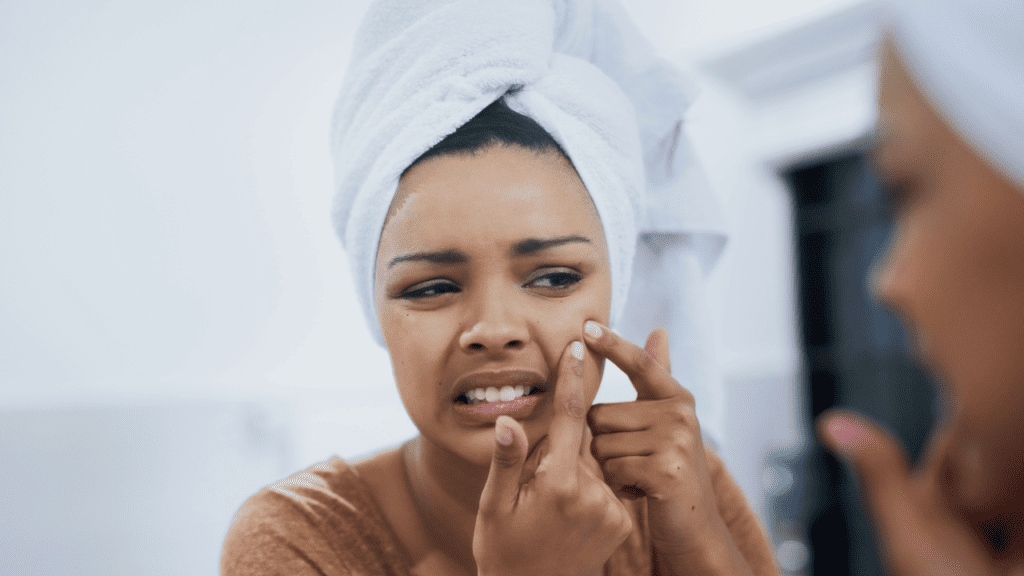
Popping a pimple may seem like a quick fix, but it can actually lead to more harm than good. Inflamed pimples, also known as blind pimples, are particularly tricky to deal with as they are not yet ready to be popped and usually when we try, they don’t pop at all. Here are some reasons why you should avoid popping a pimple:
Risks of Popping Pimples
When you pop a pimple, you risk pushing bacteria and oil deeper into your skin. This can lead to infection and inflammation, making the pimple even more painful and difficult to treat. In severe cases, popping a pimple can even cause scarring, which can be permanent.
When to See a Dermatologist
If you have cystic acne or are experiencing frequent breakouts, it’s best to seek the advice of a dermatologist. They can help you develop a treatment plan that is tailored to your skin type and needs. A dermatologist can also provide you with professional extractions, which are safer and more effective than popping pimples yourself.
In summary, popping a pimple may seem like a quick fix, but it can actually lead to more harm than good. It’s best to avoid popping pimples altogether and seek the advice of a dermatologist if you’re experiencing frequent breakouts or have cystic acne.
Alternative Treatments and Preventative Measures

Over-the-Counter Solutions
For those who cannot resist the urge to pop a pimple, over-the-counter solutions can help counter the inflammation quickly. Salicylic acid and benzoyl peroxide are two popular acne-fighting ingredients that can be found in many drugstore products. Salicylic acid works by exfoliating the skin and unclogging pores, while benzoyl peroxide kills bacteria that cause acne. Benzoyl peroxide in particular is great for people who experience hormonal, blind pimples. However we may cause skin irritation if you have very sensitive skin.
Home Remedies
If you prefer a more natural approach, there are several home remedies that can help reduce inflammation and pain. Applying a warm compress to the affected area can help increase blood flow and reduce swelling. Ice can also be used to numb the area and reduce redness. Tea tree oil is another natural remedy that has antimicrobial properties and can help reduce inflammation.
Professional Treatments
For severe cases, a dermatologist may recommend professional treatments such as antibiotics or retinoids. Antibiotics can help kill bacteria and reduce inflammation, while retinoids can help unclog pores and prevent future breakouts. In some cases, birth control pills may also be prescribed to help regulate hormones that can cause acne.
Prevention Tips
Preventing pimples from forming in the first place is the best way to avoid the pain and discomfort of a blind pimple. Using non-comedogenic products and wearing sunscreen can help prevent clogged pores and breakouts. Keeping the skin clean and avoiding touching the face can also help prevent the spread of bacteria.
Caring for Inflamed or Painful Acne
When dealing with inflamed or painful acne, it is important to take both immediate and long-term actions to reduce pain and prevent further breakouts. Here are some strategies to consider:
Immediate Actions to Reduce Pain
- Don’t pop it: As tempting as it may be, popping a pimple that hurts is not recommended, especially if it is a blind pimple. This can lead to further inflammation and scarring.
- Apply a warm compress: Placing a warm compress on the affected area can help to reduce pain and inflammation. This can be done by soaking a clean cloth in warm water and holding it against the pimple for several minutes at a time, several times a day.
- Clean the area: Keeping the affected area clean is important to prevent further breakouts and reduce the risk of infection. Use a gentle cleanser and avoid scrubbing or irritating the skin.
Long-Term Skin Care Strategies
- Use topical creams: Topical creams containing benzoyl peroxide, salicylic acid, or retinoids can help to reduce inflammation and prevent future breakouts. These should be used as directed by a dermatologist.
- Consider cortisone injections: In some cases, a dermatologist may recommend a cortisone injection to reduce inflammation and pain. This should only be done by a trained professional.
- Take oral antibiotics: In severe cases, oral antibiotics may be prescribed to reduce inflammation and prevent infection. These should only be taken under the guidance of a healthcare professional.
- Address hormonal fluctuations: Hormonal fluctuations can contribute to the development of inflamed or painful acne. In some cases, hormonal birth control or other medications may be recommended to address these fluctuations.
By taking these steps, individuals can reduce pain and inflammation associated with inflamed or painful acne, while also preventing further breakouts and promoting long-term skin health.
Frequently Asked Questions
What are the risks of attempting to pop an inflamed pimple?
Popping an inflamed pimple could lead to various risks such as scarring, infection, and more inflammation. The pus inside the pimple is full of bacteria that can spread to other parts of the skin, causing more pimples to form. Squeezing a pimple can also cause the pus to go deeper into the skin, which can result in more inflammation and pain. Therefore, it is not recommended to pop an inflamed pimple.
How can you effectively treat a blind pimple without popping it?
There are several ways to treat a blind pimple without popping it. Applying a warm compress to the affected area can help reduce inflammation and pain. You can also use over-the-counter acne treatments that contain benzoyl peroxide or salicylic acid. These treatments can help unclog pores and reduce inflammation. Additionally, maintaining a good skincare routine that includes cleansing, toning, and moisturizing can help prevent blind pimples from forming.
What are the typical causes of blind pimples, and how can they be prevented?
Blind pimples are usually caused by excess oil and dead skin cells that clog pores. Hormonal changes, stress, and certain medications can also contribute to the formation of blind pimples. To prevent blind pimples, it is important to maintain good hygiene and a healthy lifestyle. This includes washing your face twice a day, avoiding touching your face, and eating a balanced diet. Getting enough sleep and managing stress can also help prevent blind pimples from forming.
